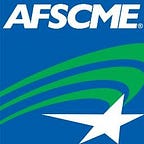By AFSCME Secretary-Treasurer Elissa McBride
When Mother’s Day comes around, I think a lot about the joys of being a parent — which continue even as my children progress into their 20s. But I also think about the challenges, like the difficulty of finding affordable, accessible child care.
It was tough two decades ago, when I was a young mother. But it’s even tougher now. And it’s not just tough for parents. It’s tough for child care providers as well. Even after the pandemic showed us how valuable and essential their work is, child care providers are still struggling to make a living. A provider said it powerfully at the Care Givers Can’t Wait conference in Washington, D.C. last month. “Just like our clients, we are also human beings,” she said. “We deserve to be treated and paid with dignity and respect.”
The U.S. continues to put almost the entire burden of finding and paying for child care on parents. Low and middle-income families struggle the most, paying up to 20% the median family income per child. And because, as a society, we have undervalued and under-resourced early childhood education, most caregivers are at or under the poverty line.
It doesn’t have to be this way. A 2021 UNICEF study showed that the United States’ child care policies rank 40th among wealthy countries, behind only Slovakia. If other countries have found a way to invest in child care and support working families, than so can we.
There are glimmers of hope here in the U.S. and the progress that’s been made is a result of unions and other worker organizations flexing our muscle at the bargaining table and the ballot box.
Child care providers are coming together to form unions so they can advocate for themselves and the families they serve. In 2020, California child care providers won their union, Child Care Providers United/AFSCME Local 3930 after a 17-year organizing effort. Now 40,000 child care providers, most of them women of color, have the power to stand up for the resources they need to do their job.
Even employers are realizing that attracting a skilled workforce means making it possible for people to find and pay for child care. And that also means providing child care while people are receiving training, as some of the best pre-apprenticeship programs do.
States are recognizing the crisis as well, and many are working with parents, providers and small businesses to develop solutions. Some states are using grants, tax credits, salary supplements and incentives to help support child care providers and working families.
There are also apprenticeships designed to help child care providers advance in the field. AFSCME District 1199C offers an apprenticeship which helps child care providers earn a degree in early childhood education while working. Child care providers learn business practices and ways to generate more income. Since 2017, the program has built a pipeline of highly skilled providers, leading to more stability in the child care field. The program is so successful that it serves as a national intermediary, helping build and shape early childhood education apprenticeship programs across the country.
And finally, the Biden-Harris administration took action last month, directing federal agencies to expand child care access. President Joe Biden’s executive order was the most sweeping executive action any president has ever taken to improve compensation, benefits and working conditions for the child care workforce while making child care more affordable and available. They would do more if they weren’t facing a wall of opposition from an anti-worker House of Representatives that does the bidding of big corporations instead of empowering families and providers.
As we honor and celebrate everything our mothers do, let’s fight for the changes that will ease their burden. We need to pass universal paid parental leave and universal pre-K, fight for publicly funded child care, increase child care provider compensation, boost federal funding for Head Start, and support child care providers as they organize. Let’s give parents access to quality, affordable child care. And let’s give providers the raises, rights, and respect they deserve.
